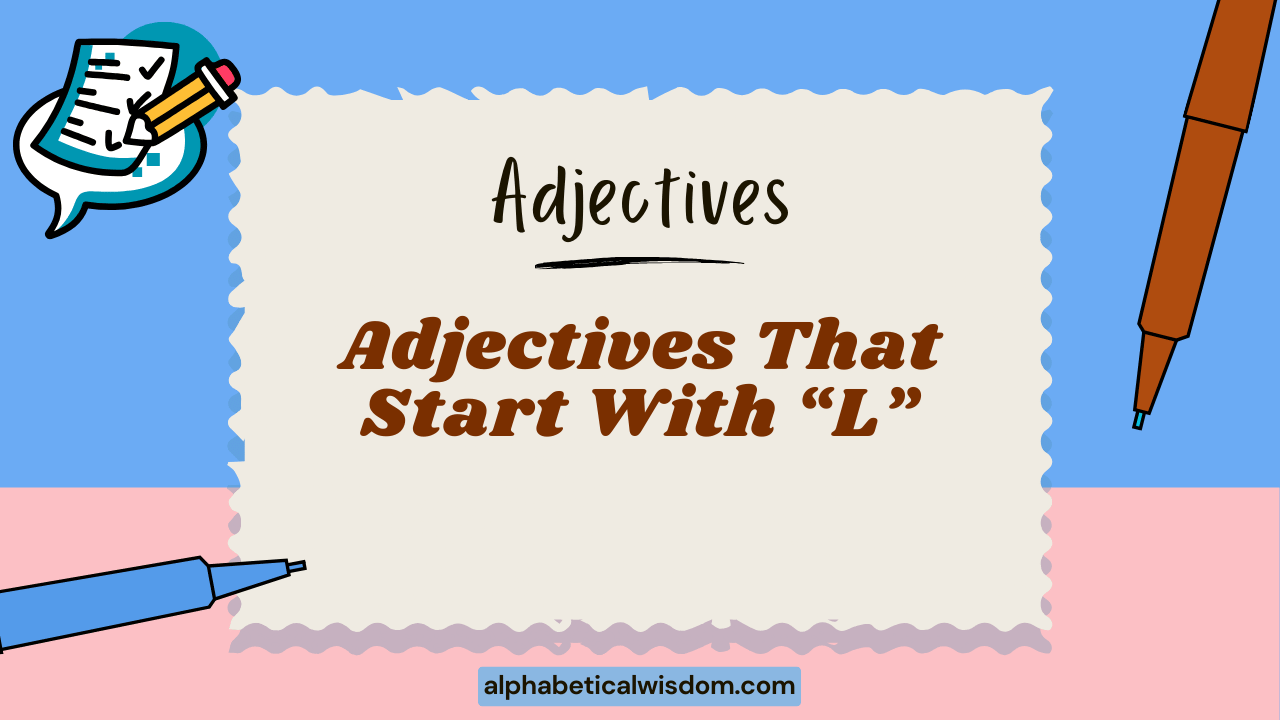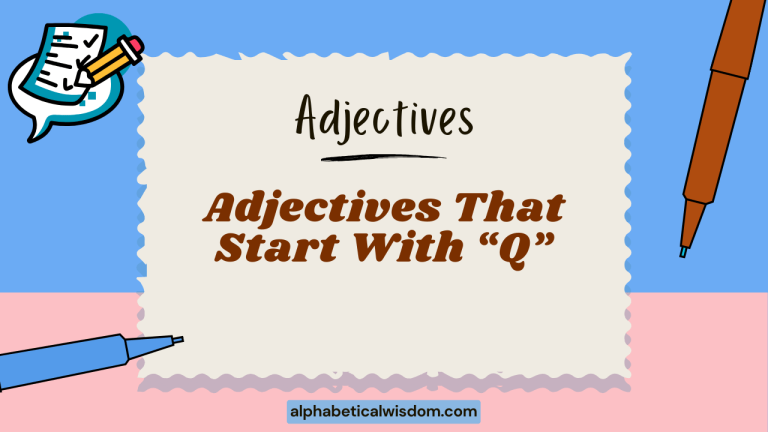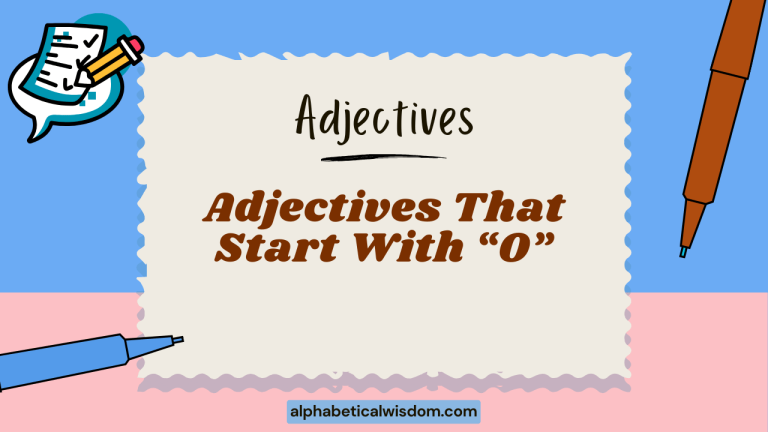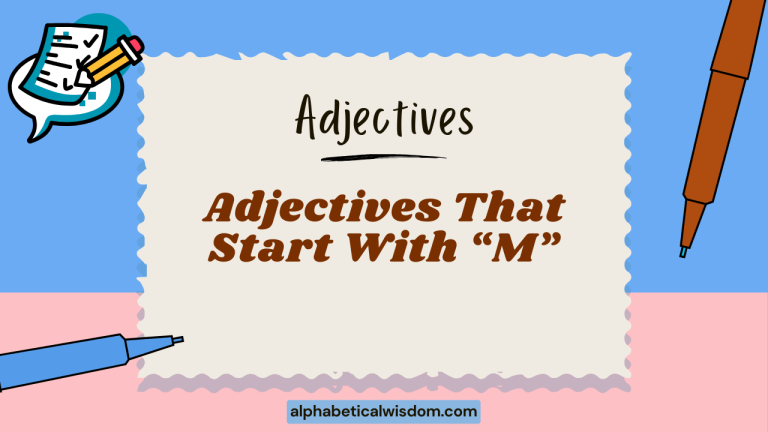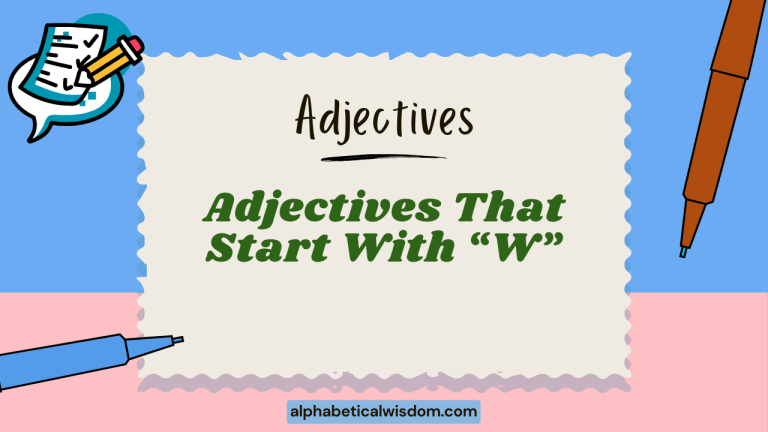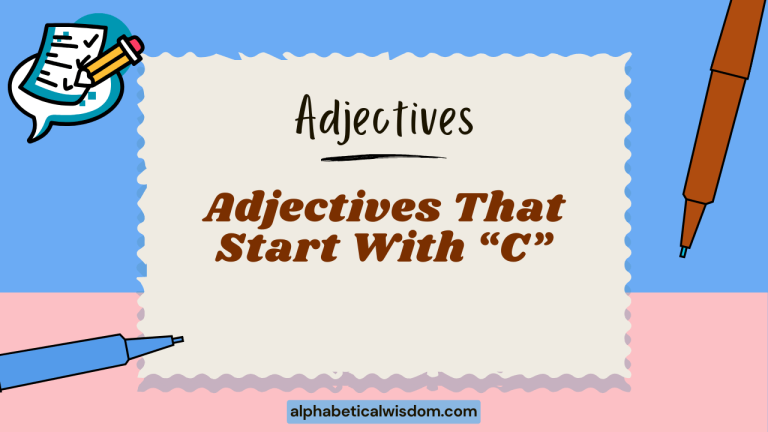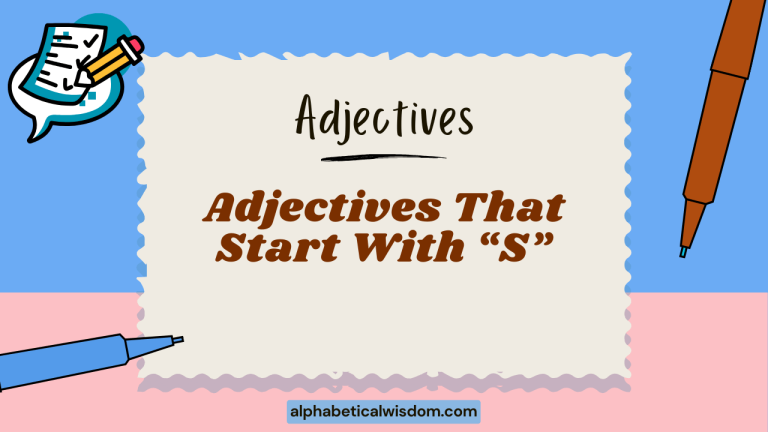Adjectives That Start With L: A Comprehensive Guide
Adjectives are the vibrant descriptors that add color and detail to our language, painting vivid pictures with words. Understanding adjectives, especially those starting with the letter “L,” enhances our ability to communicate effectively and precisely.
This comprehensive guide explores the world of “L” adjectives, providing definitions, examples, and practical exercises to improve your English language skills. Whether you are a student, a writer, or simply someone who loves language, this article will equip you with the knowledge to confidently use these adjectives in your everyday communication.
This guide is tailored for English language learners of all levels, from beginners seeking to expand their vocabulary to advanced speakers aiming to refine their descriptive abilities. Mastering adjectives, particularly those starting with “L,” will not only enrich your writing and speaking but also deepen your comprehension of the English language as a whole.
Let’s embark on this linguistic journey and discover the power of “L” adjectives!
Table of Contents
- Definition of Adjectives
- Types of Adjectives Starting with L
- Examples of Adjectives Starting with L
- Usage Rules for Adjectives Starting with L
- Common Mistakes with Adjectives Starting with L
- Practice Exercises
- Advanced Topics
- Frequently Asked Questions
- Conclusion
Definition of Adjectives
An adjective is a word that modifies a noun or pronoun, providing more information about it. Adjectives describe the qualities, characteristics, or states of being of the noun or pronoun they modify.
They answer questions like “What kind?”, “Which one?”, “How many?”, or “How much?” about the noun or pronoun.
Classification of Adjectives
Adjectives can be classified into several categories based on their function and meaning:
- Descriptive Adjectives: These describe the qualities or characteristics of a noun (e.g., large, lazy).
- Quantitative Adjectives: These indicate the quantity or amount of a noun (e.g., little, less).
- Demonstrative Adjectives: These point out specific nouns (e.g., this, that).
- Possessive Adjectives: These show ownership (e.g., his, her).
- Interrogative Adjectives: These are used in questions (e.g., which, whose).
- Proper Adjectives: These are formed from proper nouns (e.g., Italian, Shakespearean).
Function of Adjectives
Adjectives primarily function to:
- Describe: Providing details about a noun’s appearance, quality, or condition.
- Identify: Helping to distinguish one noun from others.
- Quantify: Indicating the amount or number of a noun.
Contexts of Adjectives
Adjectives can appear in various contexts within a sentence:
- Attributive Position: Before the noun they modify (e.g., a large house).
- Predicate Position: After a linking verb, describing the subject (e.g., The house is large).
Types of Adjectives Starting with L
Adjectives starting with the letter “L” encompass a wide range of meanings and usages. Here are some common types:
Descriptive Adjectives
These adjectives describe qualities or characteristics. They provide a detailed picture of the noun they modify. Examples include: large, lazy, lovely, luminous.
Quantitative Adjectives
These adjectives indicate quantity or amount. They specify how much or how many of something there is. Examples include: little, less, limited.
Evaluative Adjectives
These adjectives express an opinion or judgment about the noun they modify. They convey a subjective assessment. Examples include: lame, laudable, lucky, legitimate.
Adjectives of Origin
These adjectives indicate the origin or source of the noun. They often refer to a place or culture. Examples include: Latin, Lebanese, Lithuanian.
Examples of Adjectives Starting with L
Below are extensive examples of adjectives starting with “L,” categorized for clarity. Each category provides a variety of words to illustrate different shades of meaning and usage.
Table 1: Descriptive Adjectives Starting with L
This table illustrates descriptive adjectives that start with the letter “L.” These adjectives are used to describe the qualities and characteristics of nouns, providing more detail and vividness to descriptions.
| Adjective | Example Sentence |
|---|---|
| Large | The large elephant lumbered through the jungle. |
| Lazy | The lazy cat slept in the sun all day. |
| Lovely | She wore a lovely dress to the party. |
| Luminous | The moon cast a luminous glow over the lake. |
| Luxurious | They stayed in a luxurious hotel during their vacation. |
| Loyal | The dog was a loyal companion. |
| Lively | The city has a lively nightlife. |
| Long | He took a long walk in the park. |
| Loose | The loose tooth wiggled when he touched it. |
| Lost | The lost child was found by the police. |
| Low | The bird flew low over the fields. |
| Liquid | The liquid soap poured easily from the bottle. |
| Literate | A literate society is essential for progress. |
| Local | The local market offers fresh produce. |
| Lonely | The lonely house stands at the end of the road. |
| Loud | The loud music disturbed the neighbors. |
| Lush | The garden was lush with flowers and greenery. |
| Lyric | The poem has a lyric quality. |
| Lasting | They formed a lasting friendship. |
| Liberal | The university has a liberal arts program. |
| Legal | The company operated within legal boundaries. |
| Level | The surface of the table is level. |
| Likeable | He is a very likeable person. |
| Likely | It is likely to rain tomorrow. |
| Linear | The design has a linear pattern. |
| Little | She has a little dog. |
| Logical | His argument was very logical. |
| Lucky | She felt lucky to have such supportive friends. |
Table 2: Quantitative Adjectives Starting with L
This table presents quantitative adjectives that begin with the letter “L.” These adjectives specify the quantity or amount of a noun, indicating how much or how many there are.
| Adjective | Example Sentence |
|---|---|
| Little | There is little time left to finish the project. |
| Less | He spent less money this month than last month. |
| Limited | They have limited resources available for the task. |
| Least | She spent the least amount of time on the assignment. |
| Lowest | That was the lowest price ever paid for that item. |
| Lackluster | Attendance was lackluster this year. |
| Lean | He has a lean budget this month. |
| Leftover | There was leftover food from the party. |
| Lacking | The project was lacking in detail. |
| Last | They had the last piece of cake. |
| Late | The late payments incurred fees. |
| Lost | He has lost all patience with them. |
| Low | They are running low on supplies. |
| Least | That was the least he could do. |
Table 3: Evaluative Adjectives Starting with L
This table showcases evaluative adjectives that start with “L.” These adjectives express an opinion or judgment about the noun they modify, conveying a subjective assessment.
| Adjective | Example Sentence |
|---|---|
| Lame | That’s a lame excuse for being late. |
| Laudable | His efforts to help the community were laudable. |
| Lucky | She felt lucky to have such supportive friends. |
| Legitimate | They had a legitimate reason for their absence. |
| Lovable | The puppy was so lovable that everyone wanted to pet it. |
| Lousy | They had a lousy time at the event. |
| Lethal | The poison was lethal. |
| Liberal | The university has a liberal arts program. |
| Legal | The company operated within legal boundaries. |
| Loyal | The dog was a loyal companion. |
| Luminous | The moon cast a luminous glow over the lake. |
| Luxurious | They stayed in a luxurious hotel during their vacation. |
| Likable | He is a very likable person. |
| Logical | His argument was very logical. |
Table 4: Adjectives of Origin Starting with L
This table provides adjectives of origin that start with “L.” These adjectives indicate the origin or source of the noun, often referring to a place or culture.
| Adjective | Example Sentence |
|---|---|
| Latin | He studied Latin literature in college. |
| Lebanese | They enjoyed Lebanese cuisine at the restaurant. |
| Lithuanian | She has Lithuanian ancestry. |
| Liberian | The Liberian flag is unique. |
| Laotian | They visited a Laotian temple. |
Table 5: Miscellaneous Adjectives Starting with L
This table includes a variety of adjectives starting with “L” that do not fit neatly into the other categories. These adjectives cover a range of meanings and usages, adding depth and versatility to your vocabulary.
| Adjective | Example Sentence |
|---|---|
| Last | This is the last chance to participate. |
| Late | He arrived late to the meeting. |
| Left | Turn left at the next intersection. |
| Linear | The graph shows a linear progression. |
| Living | He is a living legend. |
| Local | The local farmers market is open on Saturdays. |
| Lost | The lost key was found under the sofa. |
| Low | The price of gas is very low right now. |
Usage Rules for Adjectives Starting with L
Using adjectives correctly involves understanding their placement, agreement, and modification. Here are some key rules to follow when using adjectives that start with “L.”
Placement of Adjectives
Adjectives typically appear before the noun they modify (attributive position). However, they can also appear after a linking verb (predicate position).
- Attributive: The large dog barked loudly.
- Predicate: The dog is large.
Order of Adjectives
When using multiple adjectives, follow a general order:
- Opinion
- Size
- Age
- Shape
- Color
- Origin
- Material
- Purpose
For example: a lovely large old round blue Italian leather writing desk.
Agreement
In English, adjectives do not change form to agree with the noun they modify in terms of number or gender. However, it’s essential to use the correct article (a/an/the) based on the adjective’s first sound.
- A large house.
- An ugly car.
Modification of Adjectives
Adjectives can be modified by adverbs to intensify or qualify their meaning. Common adverbs used to modify adjectives include very, extremely, quite, and slightly.
- The movie was very long.
- The task was extremely laborious.
Exceptions and Special Cases
Some adjectives have specific usage rules or exceptions:
- Proper Adjectives: These are derived from proper nouns and are always capitalized (e.g., Latin, Lebanese).
- Compound Adjectives: These are formed by combining two or more words (e.g., long-term, low-cost).
Common Mistakes with Adjectives Starting with L
Even experienced English speakers can make mistakes with adjectives. Here are some common errors to avoid when using adjectives that start with “L.”
Incorrect Order of Adjectives
Incorrect: A blue large car.
Correct: A large blue car.
Misusing Articles
Incorrect: A ugly house.
Correct: An ugly house.
Incorrect Adjective Form
Incorrect: The movie was longly.
Correct: The movie was long.
Confusing Adjectives with Adverbs
Incorrect: He spoke loud.
Correct: He spoke loudly.
Redundancy
Incorrect: A very luminous bright star.
Correct: A luminous star.
Practice Exercises
Test your understanding of adjectives starting with “L” with these practice exercises. Each exercise focuses on a different aspect of adjective usage.
Exercise 1: Identifying Adjectives
Identify the adjectives in the following sentences.
| Question | Answer |
|---|---|
| 1. The lazy dog slept all day. | lazy |
| 2. She wore a lovely dress to the party. | lovely |
| 3. The luminous moon lit up the night sky. | luminous |
| 4. They stayed in a luxurious hotel. | luxurious |
| 5. He is a loyal friend. | loyal |
| 6. The city has a lively nightlife. | lively |
| 7. She took a long walk. | long |
| 8. The loose tooth wiggled. | loose |
| 9. The lost child was found. | lost |
| 10. The low price attracted customers. | low |
Exercise 2: Using Adjectives in Sentences
Complete the following sentences with an appropriate adjective starting with “L.”
| Question | Answer |
|---|---|
| 1. The _______ river flowed through the valley. | long |
| 2. She has a _______ voice. | lovely |
| 3. The _______ cat stretched in the sun. | lazy |
| 4. They live in a _______ house. | large |
| 5. The _______ glow illuminated the room. | luminous |
| 6. He is a _______ member of the community. | loyal |
| 7. The city has a _______ atmosphere. | lively |
| 8. The _______ key was found. | lost |
| 9. The _______ hanging wire was dangerous. | loose |
| 10. The company offered _______ prices. | low |
Exercise 3: Correcting Adjective Errors
Correct the adjective errors in the following sentences.
| Question | Answer | Corrected Answer |
|---|---|---|
| 1. The movie was longly. | longly | long |
| 2. A ugly house stood on the hill. | ugly | An ugly |
| 3. The loud music was annoy. | Loud | loud |
| 4. They have a less money this month. | less | little |
| 5. She felt luck to win the prize. | luck | lucky |
| 6. He is a likeablely person. | likeablely | likeable |
| 7. The car is blue large. | blue large | large blue |
| 8. The lesson was logicaly presented. | logically | logical |
| 9. The lawyer was legal. | legal | legitimate |
| 10. The party was livelyful. | livelyful | lively |
Advanced Topics
For advanced learners, here are some more complex aspects of adjectives:
Adjective Clauses
Adjective clauses, also known as relative clauses, function as adjectives by modifying nouns or pronouns. They begin with relative pronouns (who, whom, which, that) or relative adverbs (where, when, why).
- The book that I borrowed from the library is very interesting.
- The restaurant where we had dinner is now closed.
Participles as Adjectives
Present participles (ending in -ing) and past participles (usually ending in -ed or -en) can function as adjectives.
- The running water was refreshing. (present participle)
- The broken window was replaced. (past participle)
Absolute Adjectives
Absolute adjectives have meanings that are considered to be all-or-nothing. They cannot be intensified or compared because they already represent the highest degree of the quality they describe (e.g., unique, perfect, absolute).
While traditionally these are considered non-gradable, in modern usage, they are often intensified, though this can be controversial.
Frequently Asked Questions
Here are some frequently asked questions about adjectives starting with “L.”
- What is the difference between an adjective and an adverb?
An adjective modifies a noun or pronoun, while an adverb modifies a verb, adjective, or another adverb. Adjectives describe qualities or characteristics, while adverbs describe how, when, where, or to what extent something is done.
- How do I know the correct order of adjectives?
The general order is opinion, size, age, shape, color, origin, material, and purpose. When in doubt, trust your ear and choose the order that sounds most natural.
- Can a noun be used as an adjective?
Yes, nouns can function as adjectives. These are called noun adjuncts or attributive nouns (e.g., book store, computer screen).
- What are compound adjectives?
Compound adjectives are formed by combining two or more words, often hyphenated (e.g., long-term, low-cost). They function as a single adjective modifying a noun.
- How do I use proper adjectives correctly?
Proper adjectives are derived from proper nouns and are always capitalized (e.g., Latin, Lebanese). They should be used to describe something related to the proper noun.
- Are there adjectives that can be both attributive and predicate?
Yes, many adjectives can be used in both positions. For example: “The large house” (attributive) and “The house is large” (predicate).
- What is the difference between “less” and “fewer”?
“Less” is used with uncountable nouns (e.g., less water, less time), while “fewer” is used with countable nouns (e.g., fewer cars, fewer people).
- How can I improve my use of adjectives in writing?
Read widely to observe how skilled writers use adjectives, practice writing descriptive passages, and ask for feedback on your writing.
- What are some common adjective suffixes?
Common adjective suffixes include -able, -ible, -al, -ful, -less, -ous, -ive, -ant, and -ent (e.g., readable, sensible, national, beautiful, careless, dangerous, active, pleasant, different).
- What is a demonstrative adjective?
A demonstrative adjective points out a specific noun. The demonstrative adjectives are this, that, these and those. For example: This book is mine.
Conclusion
Mastering adjectives, particularly those starting with the letter “L,” is a crucial step in enhancing your English language proficiency. By understanding their definitions, types, usage rules, and common mistakes, you can significantly improve your ability to describe and communicate effectively.
Remember to practice regularly, read widely, and pay attention to how native speakers use adjectives in their speech and writing. With consistent effort, you will become more confident and skilled in using adjectives to enrich your language and express yourself with greater precision and flair.
Keep exploring, keep learning, and let the power of “L” adjectives illuminate your linguistic journey!
